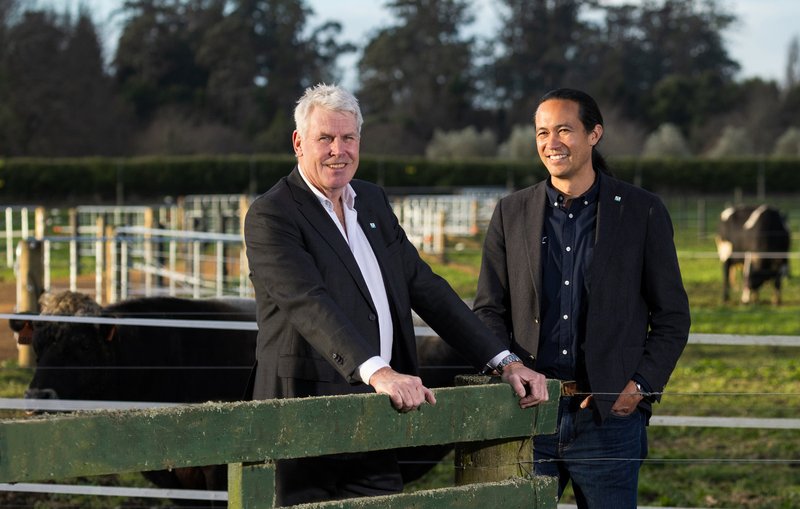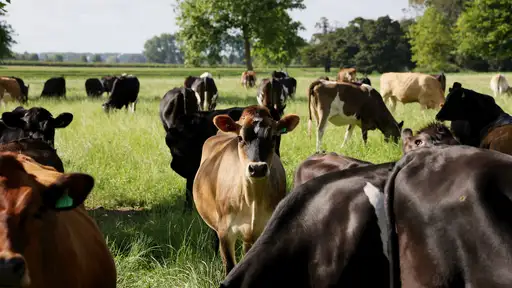LIC has today announced its financial result for the 2022-23 year, fuelled by an increased farmer uptake in premium genetics and herd improvement services to breed highly efficient cows, with a lower emissions footprint.
LIC will return $23.3 million in dividend* to its co-operative shareholders, equating to 16.38 cents per share with a 20.1% gross yield on the share price. The dividend will be paid on 18 August 2023.
Reporting increased revenue* (up 5.1%) but a drop in underlying earnings* (down 7.6%) compared to the same period last year, Board Chair Murray King said the co-op has delivered a solid financial performance, considering the challenging economic conditions.
“The Board is pleased to present another strong result to our farmer shareholders for the sixth successive year, despite facing rising costs due to increased inflation.
“This result is a credit to our farmers for their continued support of their co-op, who like us have been faced with a challenging economic landscape. It enables LIC to deliver a solid dividend to shareholders at a time when increased cost pressures are being felt on farm and ensures we can continue to invest in critical R&D and technology to support a more profitable and sustainable dairy industry for Kiwi farmers.”

Summary of financials*
- Net Profit After Tax (NPAT): $27.4 million, up 2.4% from $26.7 million last year
- Total revenue from continuing operations (excl automation*): $276.5 million, up 5.1% from $263.2 million last year
- Underlying Earnings*: $23.7 million, down 7.6% from $25.7 million last year
- Strong balance sheet with no debt at year end: Total assets $382.3 million, 0.9% decrease from $385.6 million last year
- Dividend: $23.3 million – 16.38 cents per share
- View the 22-23 full-year report
*Refer notes to financial information at end
King said the result is largely driven by more farmers opting for the co-op’s premium bull teams to breed high genetic merit cows which produce more milk and have a lower emissions footprint per kilogram of milksolid.
LIC’s premium genetics range accounted for 79% of the co-op’s total artificial breeding (AB) inseminations, up from 71% the year prior.
“We’ve seen an increased uptake of our premium genetics where young, genomically selected bulls are used to fast-track genetic gain; in turn delivering more value on farm through increased productivity and improved environmental outcomes.
“The production efficiency of our national herd has never been more important than it is today. To help our sector meet its environmental goals we need to be breeding highly efficient cows, and this result shows that farmers are continuing to sharpen their focus in this area."
King said the co-op has invested more than $80 million into genomics over the last 30 years and research has confirmed that farmers are capitalising on this investment.
“Farmers consistently using LIC genetics have almost doubled the rate of genetic gain in their herds over the last 10 years - achieving 18gBW per annum.
“The increased utilisation of genomics in our breeding programme and farmer uptake of young, genomic bulls has gone hand-in-hand with the higher rates of increased genetic gain we are seeing in farmers’ herds. Not only are these farmers breeding more environmentally efficient cows, they are breeding them at a much faster rate.”
In other business highlights, DNA testing services and animal health testing increased – showing farmers remain committed to investing in technology to keep their cows healthy, protected, and productive.
Of particular note was the increase in Johne’s disease testing which reached a milestone of over 1.1 million test samples processed, an increase of 16% from the year prior.
The adoption of technology to support herd improvement and extend the artificial breeding period was also reflected in the result, with more cow wearable devices integrated with the co-op’s MINDA herd management software.
“Cow wearables are being increasingly used on New Zealand dairy farms to monitor herd performance, health, and fertility, and it’s great to see farmers integrating this technology with their MINDA software to unlock even more value,” said King.
Orders for sexed semen increased, as more farmers factor sexed semen into their breeding goals to accelerate the rate of genetic gain on farm. International exports also saw increased demand for sexed semen (up 52%), while overall straws numbers sent offshore decreased due to a challenging supply environment.
“Sexed semen continues to be an important tool on farm to enable farmers to generate more heifer replacements from their best-performing animals,” said King.
“We see this technology as being a central part of the industry’s future and we are committed to reducing the variation in conception rates year-on-year. This season the non-return rate for sexed semen was below what we usually expect and several enhancements and changes to our processes have been made. This will continue to be monitored closely through the winter mating period.”
During the 2022-23 year, the co-op invested $18.6 million into research & development, up from $18.2 million the year prior - retaining its position as one of the largest investors in R&D and new product development for the agri sector, at 6.7% of revenue.
King said the co-op’s investment into R&D and technology is increasingly important, with the growing environmental challenges the dairy sector is facing.
“As a farmer-owned co-op, we know that investment in R&D is key to helping our sector meet its environmental goals and drive positive change when it comes to tackling problems like climate change.
“New Zealand farmers are already some of the most efficient milk producers in the world, and our continued investment and focus on innovation is supporting them to retain this title.”
A significant share of the co-op’s R&D investment contributes to its world-leading methane research programme alongside CRV, with funding support from the New Zealand Agricultural Greenhouse Gas Research Centre. The programme is investigating the genetic link between methane emissions from bulls and their genetics to ultimately enable farmers to breed low methane-emitting cows.
King said the programme, now in its third year, has been working in partnership with Pāmu to breed from bulls identified to be high or low methane emitters. After their daughters are born, their emissions will be measured during their first milking season to ensure they’re representative of their fathers.
Outlook
King said LIC will continue to be firmly guided by its primary focus of delivering on their three commitments to farmer shareholders - operational excellence, faster genetic improvement, and software reliability and performance. The co-op’s performance against these commitments during the 2022-23 year will be reported on at its Annual Meeting in October.
The co-op expects underlying earnings* for 2023-24 to be in the range of $22-28 million, assuming no significant climate event or milk price change takes place between now and then.
This will be King’s final full year result with LIC after announcing he will retire from the Board at the co-op’s October Annual Meeting. After 14 years of service to LIC, King said the co-op’s outlook is bright.
“LIC is fit to play its role in supporting farmer shareholders as they navigate the unique challenges facing the dairy sector both now and into the future. As I approach the end of my term as Board Chair, I’m proud to be leaving the co-op in a strong position with a healthy balance sheet, and to have watched LIC’s transformation into the modern, progressive co-op it is today.”
*Notes to financial information
These annual results include the annual non-cash revaluations of LIC’s major biological asset, the bull team, and the outstanding Nil Paid Ordinary Shares receivable, which are both required to reflect “fair value” under accounting standards. Figures have been audited. These numbers should be all read in conjunction with the financial accounts.
- Underlying Earnings: This is LIC’s NPAT excluding bull valuation, nil paid share valuation movements and, for the previous year, the one-off gain on divestment of Automation and is considered useful to investors as it is the basis on which LIC has historically reported and determination of dividends. Non-GAAP financial information does not have a standardised meaning prescribed by GAAP and therefore may not be comparable to similar financial information presented by other entities.
- Discontinued operations: LIC completed the divestment of its automation business in 2021-22. Accounting standards require profits from the Automation business results to be separately disclosed as Discontinued Operations.
- Nil Paid Ordinary Shares: These were issued to shareholders in 2018 as part of the share simplification process which brought together LIC’s two previous classes of shares into one Ordinary Share. For each co-operative share held, one Fully Paid Ordinary Share and three Nil Paid Ordinary Shares were issued. Nil Paid Ordinary Shares carry the same rights to dividends and voting as Ordinary Shares but cannot be traded on the NZX until they are fully paid up. Dividends paid on remaining Nil Paid Shares are automatically retained by LIC to pay down the remaining unpaid shares. LIC records an estimate of the fair value of the outstanding Nil Paid Ordinary Shares receivable at balance date.
- Bull team valuation: The annual non-cash revaluation of the co-op’s largest biological asset was $97.6 million. This is up from $93.1 million the previous year, mainly due to the continuing shift to premium products. The valuation is based on an independent model that looks at future revenue streams and costs associated with the current bulls owned, discounted back to current value.
- Dividend: The fully imputed dividend represents 80% of underlying earnings, consistent with previous years, but also includes an additional $4.3m to recognise the portion of cash dividends on Nil Paid Shares in 2022-23 that had been retained to pay down unpaid shares.




